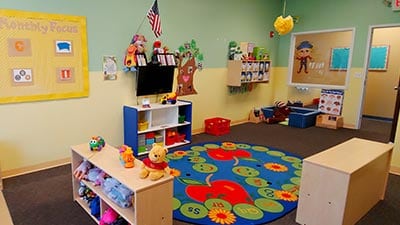Toddler Classrooms
Early Childhood Education for Toddlers 12-36 Months
Early Childhood Education for Toddlers 12-36 Months
Our toddler classrooms in Johnson County provide inviting, hands-on activities that allow for much-needed exploration. Each day is packed with carefully designed, structured activities, as well as free play. In a toddler classroom, learning spaces can offer an outlet for young children to learn through play and communication. These inspiring spaces for young children provide a place to do fun activities while also building the skills toddlers are busy learning.
Classroom activities emphasize cognitive and physical milestones for toddlers such as increasing verbal skills, self-awareness, and social interactions. We also work diligently on motor skills such as walking and running, and self-help skills, including eating and dressing.

Our toddler classes use a curriculum designed around nurturing a child’s curiosity through exploring and play. Here at Kiddi Kollege, we have developed our own daily curriculum and themes throughout our 65+ years in the early educational field.
Our programs focus on enhancing and encouraging the simple joys of childhood. Our teachers support and nurture each child’s curiosity to learn, feel, and explore.
We keep parents in the loop each day with frequent updates via Brightwheel, our messaging app!
Learn more about the importance of early childhood education on our blog!
Kiddi Kollege teachers coordinate daily learning experiences appropriate to the developmental level of the child. The educational goals of the curriculum are to develop the following: